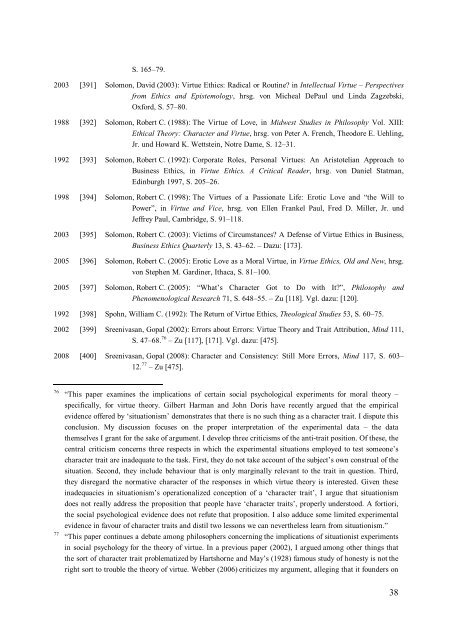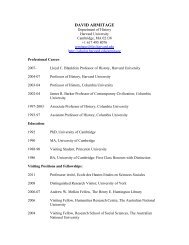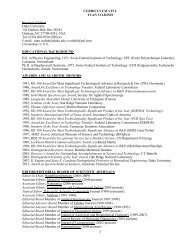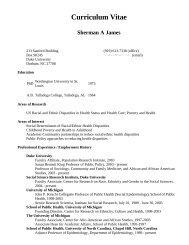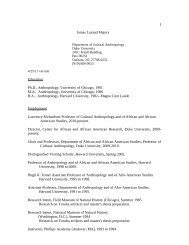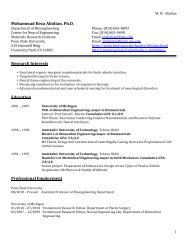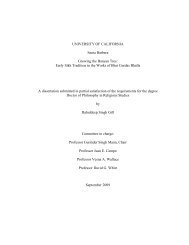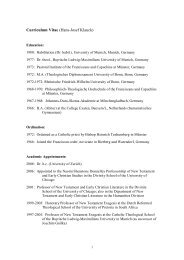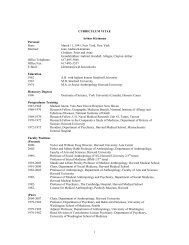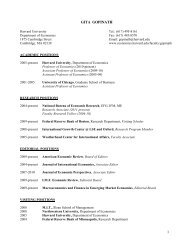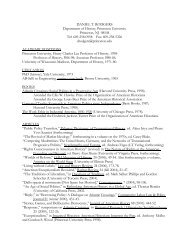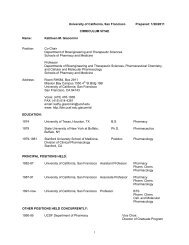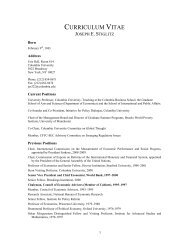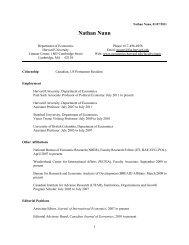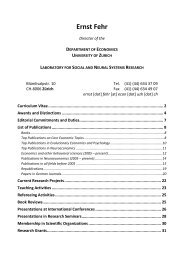S. 165–79.2003 [391] Solom<strong>on</strong>, David (2003): <strong>Virtue</strong> Ethics: Radical or Routine? in Intellectual <strong>Virtue</strong> – Perspectivesfrom Ethics and Epistemology, hrsg. v<strong>on</strong> Micheal DePaul und Linda Zagzebski,Oxford, S. 57–80.1988 [392] Solom<strong>on</strong>, Robert C. (1988): The <strong>Virtue</strong> of Love, in Midwest Studies in Philosophy Vol. XIII:Ethical Theory: Character and <strong>Virtue</strong>, hrsg. v<strong>on</strong> Peter A. French, Theodore E. Uehling,Jr. und Howard K. Wettstein, Notre Dame, S. 12–31.1992 [393] Solom<strong>on</strong>, Robert C. (1992): Corporate Roles, Pers<strong>on</strong>al <strong>Virtue</strong>s: An Aristotelian Approach toBusiness Ethics, in <strong>Virtue</strong> Ethics. A Critical Reader, hrsg. v<strong>on</strong> Daniel Statman,Edinburgh 1997, S. 205–26.1998 [394] Solom<strong>on</strong>, Robert C. (1998): The <strong>Virtue</strong>s of a Passi<strong>on</strong>ate Life: Erotic Love and “the Will toPower”, in <strong>Virtue</strong> and Vice, hrsg. v<strong>on</strong> Ellen Frankel Paul, Fred D. Miller, Jr. undJeffrey Paul, Cambridge, S. 91–118.2003 [395] Solom<strong>on</strong>, Robert C. (2003): Victims of Circumstances? A Defense of <strong>Virtue</strong> Ethics in Business,Business Ethics Quarterly 13, S. 43–62. – Dazu: [173].2005 [396] Solom<strong>on</strong>, Robert C. (2005): Erotic Love as a Moral <strong>Virtue</strong>, in <strong>Virtue</strong> Ethics, Old and New, hrsg.v<strong>on</strong> Stephen M. Gardiner, Ithaca, S. 81–100.2005 [397] Solom<strong>on</strong>, Robert C. (2005): “What’s Character Got to Do with It?”, Philosophy andPhenomenological Research 71, S. 648–55. – Zu [118]. Vgl. dazu: [120].1992 [398] Spohn, William C. (1992): The Return of <strong>Virtue</strong> Ethics, Theological Studies 53, S. 60–75.2002 [399] Sreenivasan, Gopal (2002): Errors about Errors: <strong>Virtue</strong> Theory and Trait Attributi<strong>on</strong>, Mind 111,S. 47–68. 76 – Zu [117], [171]. Vgl. dazu: [475].2008 [400] Sreenivasan, Gopal (2008): Character and C<strong>on</strong>sistency: Still More Errors, Mind 117, S. 603–12. 77 – Zu [475].7677“This paper examines the implicati<strong>on</strong>s of certain social psychological experiments for moral theory –specifically, for virtue theory. Gilbert Harman and John Doris have recently argued that the empiricalevidence offered by ‘situati<strong>on</strong>ism’ dem<strong>on</strong>strates that there is no such thing as a character trait. I dispute thisc<strong>on</strong>clusi<strong>on</strong>. My discussi<strong>on</strong> focuses <strong>on</strong> the proper interpretati<strong>on</strong> of the experimental data – the datathemselves I grant for the sake of argument. I develop three criticisms of the anti-trait positi<strong>on</strong>. Of these, thecentral criticism c<strong>on</strong>cerns three respects in which the experimental situati<strong>on</strong>s employed to test some<strong>on</strong>e’scharacter trait are inadequate to the task. First, they do not take account of the subject’s own c<strong>on</strong>strual of thesituati<strong>on</strong>. Sec<strong>on</strong>d, they include behaviour that is <strong>on</strong>ly marginally relevant to the trait in questi<strong>on</strong>. Third,they disregard the normative character of the resp<strong>on</strong>ses in which virtue theory is interested. Given theseinadequacies in situati<strong>on</strong>ism’s operati<strong>on</strong>alized c<strong>on</strong>cepti<strong>on</strong> of a ‘character trait’, I argue that situati<strong>on</strong>ismdoes not really address the propositi<strong>on</strong> that people have ‘character traits’, properly understood. A fortiori,the social psychological evidence does not refute that propositi<strong>on</strong>. I also adduce some limited experimentalevidence in favour of character traits and distil two less<strong>on</strong>s we can nevertheless learn from situati<strong>on</strong>ism.”“This paper c<strong>on</strong>tinues a debate am<strong>on</strong>g philosophers c<strong>on</strong>cerning the implicati<strong>on</strong>s of situati<strong>on</strong>ist experimentsin social psychology for the theory of virtue. In a previous paper (2002), I argued am<strong>on</strong>g other things thatthe sort of character trait problematized by Hartshorne and May’s (1928) famous study of h<strong>on</strong>esty is not theright sort to trouble the theory of virtue. Webber (2006) criticizes my argument, alleging that it founders <strong>on</strong>38
2009 [401] Sreenivasan, Gopal (2009): Disunity of <strong>Virtue</strong>, Journal of Ethics 13, S. 195–212. 782008 [402] Stangl, Rebecca (2008): A Dilemma for Particularist <strong>Virtue</strong> Ethics, Philosophical Quarterly 58,S. 665–78. 792001 [403] Stark, Susan (2001): <strong>Virtue</strong> and Emoti<strong>on</strong>, Nous 35, S. 440–55.2004 [404] Stark, Susan (2004): A Change of Heart: Moral Emoti<strong>on</strong>s, Transformati<strong>on</strong>, and Moral <strong>Virtue</strong>,Journal of Moral Philosophy 1, S. 31–50. 801995 [405] Statman, Daniel (1995): <strong>Virtue</strong> Ethics and Psychology, Internati<strong>on</strong>al Journal of AppliedPhilosophy 9, S. 43–50.1997 [406] Statman, Daniel (1997): Introducti<strong>on</strong> to <strong>Virtue</strong> Ethics, in <strong>Virtue</strong> Ethics. A Critical Reader, hrsg.v<strong>on</strong> Daniel Statman, Edinburgh, S. 1–41.1997 [407] Statman, Daniel (Hrsg.) (1997): <strong>Virtue</strong> Ethics. A Critical Reader, Edinburgh.1998 [408] Stemmer, P./Schönberger, R./Höffe, O./Rapp, Ch. (1998): Tugend, in Historisches Wörterbuchder Philosophie, hrsg. v<strong>on</strong> Joachim Ritter und Karlfried Gründer, Basel, Bd. 10, S.1532–70.787980an ambiguity in ‘cross-situati<strong>on</strong>al c<strong>on</strong>sistency’ and that Milgram’s (1974) obedience experiment is immuneto the objecti<strong>on</strong>s I levelled against Hartshorne and May. Here I resp<strong>on</strong>d to his criticisms. The most importanterror in Webber's argument is that it overlooks a distincti<strong>on</strong> between ‘<strong>on</strong>e time performance’ experimentsand ‘iterated trial’ experiments. I explain whythe former cannot begin to trouble the theory of virtue.”“This paper argues against the unity of the virtues, while trying to salvage some of its attractive aspects. Ifocus <strong>on</strong> the str<strong>on</strong>gest argument for the unity thesis, which begins from the premise that true virtue cannotlead its possessor morally astray. I suggest that this premise presupposes the possibility of completelyinsulating an agent’s set of virtues from any liability to moral error. I then distinguish three c<strong>on</strong>diti<strong>on</strong>s thatseparately foreclose this possibility, c<strong>on</strong>centrating <strong>on</strong> the propositi<strong>on</strong> that there is more to morality thanvirtue al<strong>on</strong>e—that is, not all moral c<strong>on</strong>siderati<strong>on</strong>s are <strong>on</strong>es to which some virtue is characteristicallysensitive. If the virtues are not unified, the situati<strong>on</strong>ist critique of virtue ethics also turns out to be moredifficult to establish than some have supposed.”“There is an obvious affinity between virtue ethics and particularism. Both stress the complexity of themoral life, the inadequacy of rule-following as a guide to moral deliberati<strong>on</strong>, and the importance ofjudgement in discerning the morally relevant features of particular situati<strong>on</strong>s. Yet it remains an openquesti<strong>on</strong> how deep the affinity goes. I argue that the radical form of particularism defended by J<strong>on</strong>athanDancy has surprisingly str<strong>on</strong>g implicati<strong>on</strong>s for virtue ethics. Adopting such a view would require the virtuetheorist either to adopt an unattractive model of moral motivati<strong>on</strong> or to embrace a fairly str<strong>on</strong>g versi<strong>on</strong> ofthe unity of the virtues.”“Inspired in part by a renewed attenti<strong>on</strong> to Aristotle ’s moral philosophy, philosophers have acknowledgedthe important role of the emoti<strong>on</strong>s in morality. N<strong>on</strong>etheless, precisely how emoti<strong>on</strong>s matter to morality hasremained c<strong>on</strong>tentious. Aristotelians claim that moral virtue is c<strong>on</strong>stituted by correct acti<strong>on</strong> and correctemoti<strong>on</strong>. But Kantians seem to require solely that agents do morally correct acti<strong>on</strong>s out of respect for themoral law. There is a crucial philosophical disagreement between the Aristotelian and Kantian moraloutlooks: namely, is feeling the correct emoti<strong>on</strong>s necessary to virtue or is it an opti<strong>on</strong>al extra, which ispermitted but not required. I argue that there are good reas<strong>on</strong>s for siding with the Aristotelians: virtuousagents must experience the emoti<strong>on</strong>s appropriate to their situati<strong>on</strong>s. Moral virtue requires a change ofheart.”39
- Page 1: Literatur
- Page 4 and 5: national Journal of Management Revi
- Page 6: 53.2010 [39] Battaly, Heather (2010
- Page 9 and 10: 2005 [60] Brady, Michael S. (2005):
- Page 11 and 12: 2008 [72] Calhoun, Cheshire (2008):
- Page 13 and 14: 1998 [93] Cooper, John M. (1998): T
- Page 15 and 16: 2005 [120] Doris, John M. (2005): R
- Page 17 and 18: 1978 [138] Foot, Philippa (1978): V
- Page 19 and 20: 1996 [166] Griffin, James (1996): V
- Page 21 and 22: 166-84.1996 [188] Hooker, Brad (199
- Page 23 and 24: Theory and Moral Practice 8, S. 387
- Page 25 and 26: Ethics, hrsg. von Patricia H. Werha
- Page 27 and 28: Deutsche Zeitschrift für Philosoph
- Page 29 and 30: 2009 [280] Miller, Christian (2009)
- Page 31 and 32: 2000 [299] Oderberg, David S. (2000
- Page 33 and 34: Moral Education 24, S. 175-184.1997
- Page 35 and 36: Southern Journal of Philosophy 14,
- Page 37: 1997 [379] Slote, Michael (1997): V
- Page 41 and 42: 2010 [416] Stohr, Karen E. (2010):
- Page 43 and 44: 2008 [441] Tessman, Lisa (2008): Re
- Page 45 and 46: 2009 [457] van Zyl, Liezl (2009): A
- Page 47 and 48: 2006 [475] Webber, Jonathan (2006):
- Page 49 and 50: 2008 [484] White, Richard (2008): R


